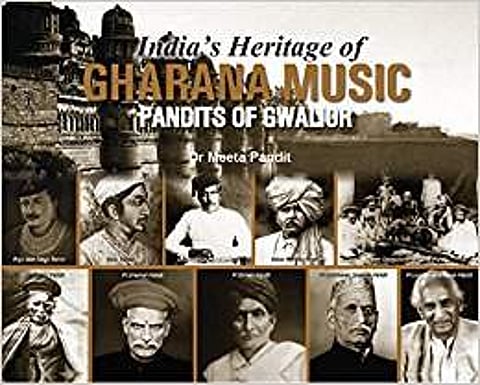

In melody-loving Gwalior, there was a time when hard-up artistes could "pawn" a raga to be redeemed by aficionados of Hindustani classical music, says a noted singer.
If musicians could not pay for something in the late 19th and early 20th centuries, they could mortgage a raga, which could be retrieved by a patron who wished to hear it, classical vocalist Meeta Pandit of the Gwalior gharana recounted.
"The artiste used to tell the music lover to first retrieve the raga, and only then would he be able to sing it," said Pandit, the sixth in the unbroken lineage of the gharana.
The legend about the musical past of the erstwhile cultural capital of India figures in her book India's Heritage of Gharana Music: Pandits of Gwalior, along with a host of anecdotes.
The book is an outcome of an emotional journey that she undertook after her elder brother Tushar Pandit died in a road accident in 1994.
He was then working on his PhD on the contribution of Gwalior Pandits to Hindustani classical music. The thesis was left incomplete by his untimely death.
His death prompted Pandit to pursue music full-time, becoming the first woman in the family to do so. She also enrolled for her PhD, registering the same topic as her brother.
"I was destined to take my brother's work to its conclusion," she said.
However, her thesis took the shape of a book only 16 years later, when she was able to leave behind the pain associated with the loss of her brother, and decided that the unique story of the musicians of Gwalior needed a telling.
"As a member of the Pandit family, it was very important to tell the story of how they learnt music, and the challenges they had to face to acquire the art," said the daughter of classical music exponent LK Pandit.
She explained how to be able to learn music, a student had to prove his or her worth. "The ustaads would teach you only if they felt you were deserving, and not from paying them just a sum of money," she said.
She recalled how the musicians zealously guarded their art. Ustad Hassu Khan and Ustad Haddu Khan would do riyaz (practice) in their basements, so that nobody but the royalty — for whom they performed — would hear them.
"Their palatial basements were big enough for horses and elephants to pass through, and often men would dress up as stable boys or caretakers of the animals to access the basement and hear them sing in an attempt to pick up the technique," she said.
The master of the Gwalior gharana, she added, was Tansen, whose strains went on to resonate in Mughal emperor Akbar's court.
According to the book, Akbar's fondness for Tansen troubled the other musicians, who looked for ways to humiliate the musician.
Once, they expressed their earnest desire to hear him perform Raga Deepak. Tansen was such a skilled singer that if he sang the raga that meant a light or lamp, they knew that everything around him would be set ablaze.
Akbar, ignorant of what was being planned, asked Tansen to perform the raga. When Tansen realised what his rivals were up to, he asked two of his disciples to sing Megh, or cloud, which would counter the fire of Deepak.
"When Tansen began Raga Deepak, the audience could feel the warmth and by the end of it, all the earthen lamps lit up, and everybody ran for their lives.
"Tansen was saved by the rain owing to the rendering of Raga Megh as per plan," she writes in the book.
The book was launched last week by politicians Jyotiraditya Scindia and Karan Singh. "The most beautiful thing about musical gharanas is that they are impartial towards religion. The cultural or regional background of the shishya or the guru holds no value when it comes to preaching," said former minister Scindia at the launch.
